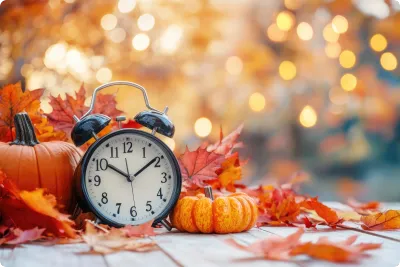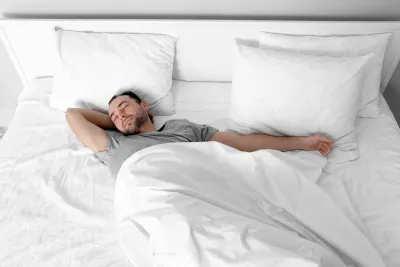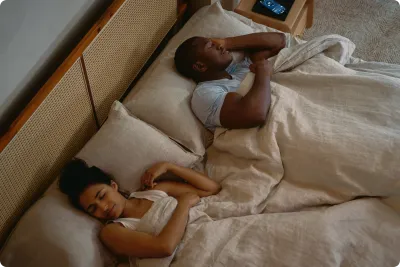Is 8 Hours of Sleep Enough? What Science Says
Ana Marie Schick: Resident Sleep Expert and Certified Health Coach • Sep 29, 2025

Key Takeaways
Eight hours is a helpful guideline, but real sleep needs depend on quality, consistency, and individual factors.
- Most adults need between 7–9 hours of sleep, but age, genetics, activity level, and lifestyle all affect the ideal amount.
- Sleep quality matters as much as duration—frequent awakenings, shallow sleep, or poor sleep stages can leave you tired even after a full night in bed.
- Common sleep disruptors like stress, late-night screen use, caffeine, and undiagnosed conditions such as sleep apnea or restless legs can undermine long sleep durations.
- Chronic poor sleep is linked to long-term health issues, including heart disease, weight gain, mood changes, and memory problems.
- If you consistently feel tired despite getting “enough” sleep, tracking your sleep or speaking with a sleep specialist may help uncover the cause.
Recent sleep research reveals that most healthy adults actually need between 7-9 hours of sleep per night. And it's not just about the recommended number of hours; the quality of your sleep matters just as much as the quantity.
Whether eight hours of sleep is enough for you depends on multiple factors, including your age, genetics, health conditions, and lifestyle choices. We've got a table below showing the recommended sleep based on age groups.
In this blog, we'll look into what science says about optimal sleep. We'll explore if 8 hours of sleep is good, why you might still feel tired even after getting the recommended amount of hours, and how to optimize your sleep.
The 8-Hour Sleep Myth: What Science Actually Says
The idea that everyone needs exactly 8 hours of sleep comes from large studies and simple health messages. But sleep medicine has moved beyond this one-size-fits-all idea.
The American Academy of Sleep Medicine and Sleep Research Society recommend at least seven hours of sleep per night for adults, with the National Sleep Foundation specifying seven to nine hours for most adults. The 8-hour recommendation sits in the middle of this range, making it a reasonable target but not a universal requirement.
A groundbreaking study following 1.1 million participants for six years found that people sleeping 6-7 hours nightly had the lowest mortality rates. [1]</a Interestingly, those habitually sleeping eight hours or more showed higher mortality rates, though this doesn’t necessarily mean longer sleep causes harm.
Some individuals are genuine “short sleepers” who function optimally on less sleep thanks to rare genetic mutations—like the one found in the DEC2 gene. For example, Thomas Edison, Nikola Tesla, and Margaret Thatcher, all known for thriving on just 4–5 hours a night.
But keep in mind, these people are rare exceptions. Most of us who think we can get by on little sleep are actually building up a sleep debt without realizing it, which slowly affects our focus, mood, and overall health over time.
How Much Sleep Do You Need?
Your sleep needs aren’t set in stone—they evolve as you do. Age is the biggest factor in how much shut-eye your body craves.
Here’s a quick breakdown of the recommended hours of sleep by age group:
Recommended Sleep Based on Age
| Age Group | Recommended Sleep Duration |
|---|---|
| Newborns (0 - 3 Months) | 14 - 17 hours |
| Infants (4 - 12 Months) | 12 - 16 hours including naps |
| Toddlers (1 - 2 years old) | 11 - 14 hours |
| Preschoolers (3 - 5 years old) | 10 - 13 hours |
| School-age Children (6 - 12 years old) | 9 - 12 hours |
| Teens (13 - 18 years old) | 8 - 10 hours |
| Adults (18 - 64 years old) | 7 - 9 hours | Older Adults (65+ years old) | 7 - 8 hours |
Several factors influence how much sleep you personally need:
- Genetics: Your genes play an important role in how much sleep you need and your natural sleep patterns. Many people naturally need less sleep, while others may require up to 9 hours to feel fully rested.
- Health Conditions: Certain health issues can increase how much sleep you need. Conditions like chronic pain, depression, anxiety, and autoimmune diseases often require more restorative sleep to help your body heal and function properly.
- Lifestyle: Factors, such as stress levels, physical activity, and work demands, can temporarily increase the amount of sleep you need. For example, athletes and individuals with high-stress jobs often require additional sleep to recover properly.
Why You Might Still Feel Tired After 8 Hours
So you just clocked a full night of, but still feel like you got hit by a truck. You may ask yourself, why? I thought I was supposed to feel awake and energized.
It's not just about how long you sleep, but how well. You could be in bed all night and still wake up drained if your sleep is bad. Maybe you're tossing and turning, waking up without realizing it, or not getting enough time in the Deep and REM stages. It’s like charging your phone with a frayed cable. The time’s there, but the power just didn’t stick.
Common Sleep Disruptors
Several factors can sabotage your sleep quality even when you’re in bed for the recommended duration:
- Stress & Anxiety: It can keep your brain awake and racing, blocking deep, restful sleep.
- Technology: Whether on your smartphone or watching TV, the blue light from these screens can disrupt melatonin production and delay your body clock.
- Sleep Schedule: Having inconsistent sleep schedules throws off your internal rhythm. It's best to have the same sleep schedule throughout the week.
- Caffeine and Alcohol: They might take the edge off, but for some, they sabotage Deep, restorative sleep and solid REM cycles.
Sleep Disorders That Affect Quality
Undiagnosed sleep disorders can leave you feeling exhausted despite spending adequate time in bed:
- Sleep Apnea: It can interrupt breathing and blocks the deep stage of sleep, often without the sleeper even knowing it.
- Restless Leg Syndrome: Sparks an uncontrollable urge to move your legs—usually right when you're trying to relax. RLS feels like your legs are buzzing, crawling, or wired with static.
- Insomnia: Turns falling, or staying asleep, into a nightly battle, leaving you stuck in bed watching the clock.
Unseen sleep disorders and issues can silently drain your sleep battery.
The Real Health Risks of Poor Sleep
Cutting corners on sleep, whether you're not getting enough hours or your sleep quality is poor, does more damage than just leaving you groggy.
Studies show that chronic sleep loss messes with almost every system in your body. [2] It can affect your mood, memory, immune system, heart health, and even shorten your lifespan.
Physical Health Impacts
- Heart Health: Less than seven hours of sleep? Higher risk of high blood pressure, heart disease, and stroke—thanks to inflammation and stress hormones damaging your arteries.
- Metabolism: Poor sleep messes with hunger hormones, increases cravings, and raises your risk of weight gain and type 2 diabetes.
- Immune System: Sleep less, get sick more. Your body makes fewer antibodies and fights off illness slower when you’re running on empty.
Mental and Cognitive Effects
- Memory Takes a Hit: Without enough Deep and REM sleep, your brain struggles to store and recall info. For some, learning gets more difficult.
- Focus Fades Fast: Even a little sleep loss slows reaction time and wrecks concentration, making accidents more likely and frequent.
- Poor Judgment: Sleep-deprived brains caused by sleep deprivation, don’t think clearly. Decision-making and problem-solving take a steep decline.
- Mood Swings Spike: Less sleep = more stress, irritability, and emotional rollercoasters. Long-term? Higher risk of anxiety and depression.
According to the Centers for Disease Control, insufficient sleep affects up to 70 million Americans, with 32.5% of adults reporting inadequate sleep on a regular basis. [3]
Optimizing Your Sleep for Better Sleep
When it comes to feeling truly rested, how you sleep often matters more than how long. Good sleep hygiene and the right sleep environment can turn your nights from restless to restorative. Learn more about sleep hygine by reading our blog.
Want to wake up feeling refreshed instead of running on empty? Discover these 13 proven tips to improve your sleep quality.

When to Visit Your Doctor
Sometimes optimizing sleep habits isn’t enough, and persistent sleep problems may indicate an underlying sleep disorder that requires medical attention. It’s perfectly okay to seek help, getting support from a healthcare professional can make all the difference in restoring your sleep health.
If you're spotting any of these red flags, it might be time to check in with a sleep specialist—and keeping track with a journal can help you spot patterns and trends along the way:
- Persistent daytime sleepiness despite spending 7-9 hours in bed
- Loud snoring accompanied by gasping or choking sounds
- Difficulty falling asleep or staying asleep most nights
- Frequent leg movements or restlessness during sleep
- Feeling unrefreshed even after a full night’s sleep
A board-certified sleep specialist can conduct thorough evaluations, including sleep studies, to determine the underlying cause. Many of these disorders are very treatable once properly diagnosed.
If you’re struggling with sleep, don’t brush it off. Talk to your primary care doctor, they can help assess your symptoms and connect you with a sleep expert if needed.
Understanding Sleep Cycles and Architecture
Normal sleep isn’t just one steady state but cycles of different stages, each helping your body and mind recover in different ways.
- Stage 1: Light sleep is the dozing-off phase.
- Stage 2: You’re more relaxed, but still not in the deep stage of sleep.
- Stage 3: This is the stage of Deep restorative sleep and it's where physical recovery, healing, and immune support happen.
- REM Sleep: Your brain’s in high gear—processing memories, emotions, and dreams.
Each full sleep cycle lasts about 90–120 minutes, and you go through 4–6 of them a night. Deeper sleep dominates early on, while REM ramps up closer to morning.
Both are key—Deeper sleep recharges your body, and REM sleep resets your brain.
Final Thought
So, is eight hours of sleep enough? It might be, but the real answer depends on you. Sleep needs vary based on age, genetics, lifestyle, and overall health. Some people thrive on 7 hours, others need closer to 9. What matters most is how you sleep, not just how long.
If you're still waking up tired after a whole night in bed, don’t ignore it. Sleep quality, disruptions, or even underlying sleep disorders could be working against you. From stress and screens to snoring and restlessness, there are a lot of sneaky culprits that can drain your sleep battery—even if you hit that 8-hour mark.
You’re not stuck with poor quality sleep. With better habits, a more supportive sleep environment, and, if needed, professional guidance, you can absolutely improve how rested and energized you feel each day.
Whether you need to fine-tune your nighttime routine or speak with a specialist, taking sleep seriously is one of the best things you can do for your health. Because when sleep improves—everything improves.
Frequently Asked Questions About 8 Hours of Sleep
Is Exactly Eight Hours of Sleep Necessary for Everyone?
No, most healthy adults typically need between 7 to 9 hours of sleep each night. Eight’s a solid target, but genetics, age, health, and lifestyle mean your sweet spot may be more or less.
Why Am I Still Tired after Eight Hours of Sleep?
Feeling tired after 8 hours typically indicates poor sleep quality rather than insufficient sleep duration. Common causes include sleep disorders like sleep apnea, stress, irregular sleep schedules, caffeine or alcohol consumption, or waking up during deep sleep phases.
Environmental factors like noise, light, or uncomfortable temperature can also fragment your sleep.
Is It Better to Sleep Six Hours Consistently or Eight Hours Irregularly?
Consistency is important for maintaining healthy circadian rhythms, but 6 hours is still below the recommended minimum for most adults. The ideal approach is to aim for 7-9 hours on a consistent schedule. If you must choose, prioritize getting at least seven hours even if the timing varies slightly.
Peer-Reviewed Research References
-
Spurgeon, D.
People Who Sleep for Seven Hours a Night Live Longest.
BMJ (British Medical Journal), 2002.
Study Type: Epidemiological Commentary
Key Finding: Summarizes population-level evidence suggesting that approximately seven hours of sleep per night is associated with the lowest mortality risk compared to shorter or longer sleep durations.
View Study
Source URL: https://pubmed.ncbi.nlm.nih.gov/11859059/
-
Colten, H.R., Altevogt, B.M.
Extent and Health Consequences of Chronic Sleep Loss and Sleep Disorders.
National Academies Press, 2006.
Study Type: National Consensus Report
Key Finding: Documents the widespread health, safety, and economic consequences of chronic sleep deprivation and untreated sleep disorders, framing sleep loss as a major public health issue.
View Study
Source URL: https://www.ncbi.nlm.nih.gov/books/NBK19961/
-
Centers for Disease Control and Prevention (CDC).
FastStats: Sleep in Adults.
CDC, 2024.
Source Type: U.S. Government Health Statistics
Key Insight: Provides up-to-date national statistics on adult sleep duration, highlighting the prevalence of insufficient sleep and its implications for public health.
View Resource
Source URL: https://www.cdc.gov/sleep/data-research/facts-stats/adults-sleep-facts-and-stats.html









